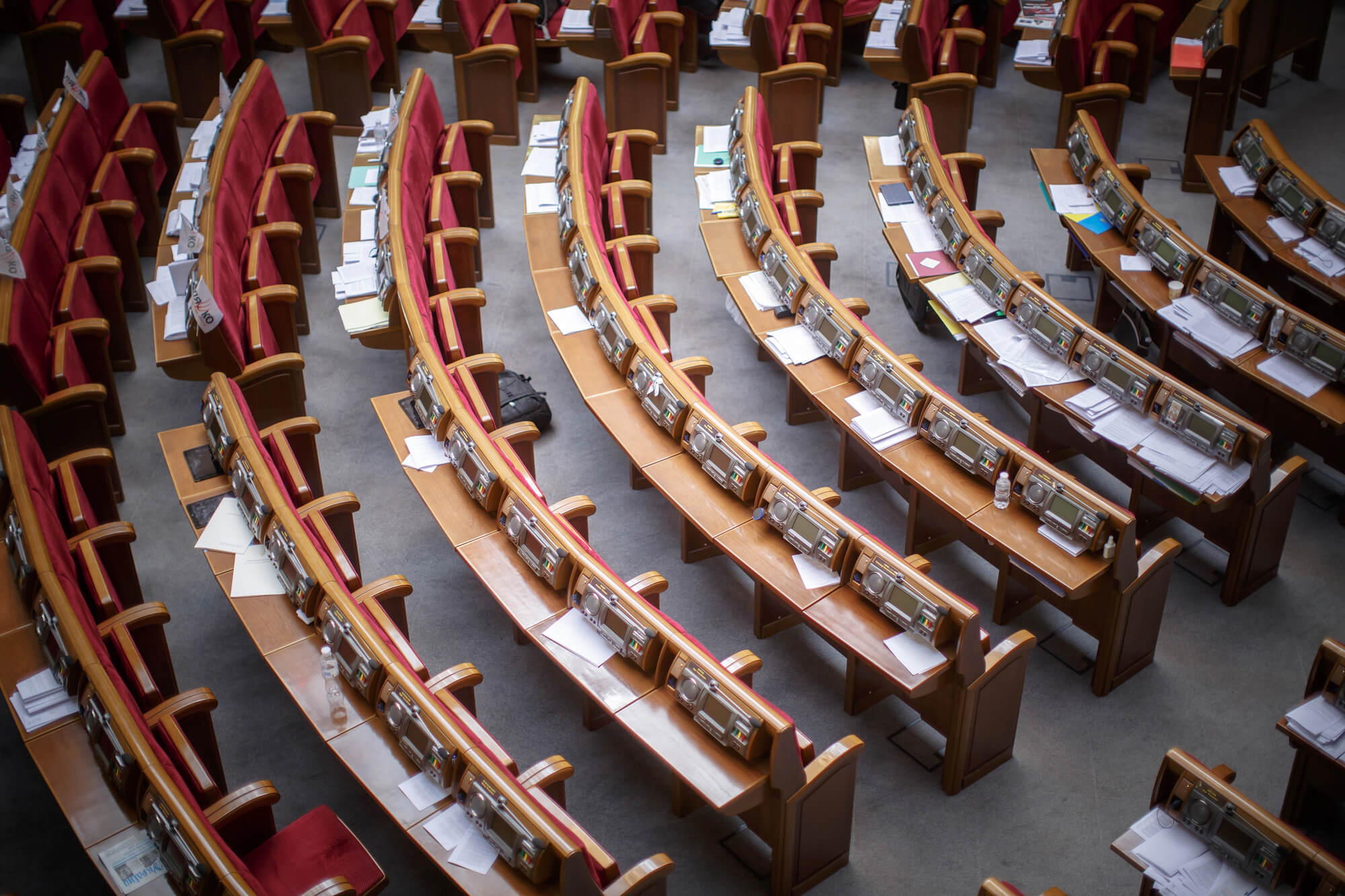Do MPs always speak the truth when addressing the Verkhovna Rada? Parliamentary debates are frequently marked by emotional appeals, loud accusations, and distortion of facts. On the one hand, this may appear to be part of the political game. On the other hand, it is a deliberate use of manipulation aimed at influencing the audience, both voters and fellow lawmakers.
Words are instruments of influence—and in a politician’s hands, they become a weapon of persuasion. Behind the façade of concern for citizens and the loud proclamations of “budget embezzlement” or “betrayal of national interests,” often lies not a pursuit of objectivity but a calculated effort to impose one’s viewpoint, shift emphasis, and secure votes. Manipulation in this context is not an anomaly but a structural element of parliamentary discourse, driven by hidden motives.
This study examines the dynamics of manipulative rhetoric during the adoption of the state budget—one of the most consequential decisions made by Parliament. This allows us to compare political language under consistent conditions (deliberation on the state budget bill) across different years and varying political contexts.
We analyze who manipulates, how, and to what extent; which tactics are used most frequently; and whether manipulative patterns have changed over time. This research not only reveals the level of manipulation in parliamentary discourse, but also helps uncover the “agenda” promoted by a particular MP or political faction—whether a speech is genuinely related to the topic under discussion or is used merely as a vehicle for political attacks or pre-election campaigning. After all, decisions made under the influence of manipulation affect more than political ratings—they determine which hospitals receive funding, how much is allocated for defense or education, and whether taxes will be raised. Understanding manipulative techniques enables citizens to think critically, navigate the noise of political messaging, and more effectively hold elected representatives accountable.
Manipulation is a communicative practice aimed at exercising control over an audience—typically against its own interests—through the deliberate distortion of information, emotional appeals, and abuse of authority. The manipulator intentionally misrepresents facts, creating the illusion that their actions serve the public good, while in reality, they benefit only themselves. Due to the subtle boundary between manipulation and outright falsehood, such distortion often borders on deliberate deception.
This study focuses on three primary types of manipulation employed during parliamentary debates.
Ideological confrontation is a form of manipulation based on constructing dichotomies such as “us versus them,” employing positive self-presentation, and discrediting opponents. This tactic enables speakers to avoid reasoned debate by replacing it with ideological conflict and moral judgment of political opponents.
Exploiting the audience’s lack of knowledge is a manipulative technique that involves deliberately using complex terminology, statistics, or specialized concepts that are difficult for the general public to verify or comprehend. This creates an impression of the speaker’s expertise or the severity of the situation, ultimately shaping distorted perceptions of reality.
Emotional appeal is a technique that relies on emotionally charged language, metaphors, exaggeration, and invective to mobilize support or apply pressure on opponents. Emotional impact often overshadows the substance of the discussion, replacing rational deliberation with political sentiment and provocative imagery.
How did we study parliamentary manipulation?
To systematically analyze manipulation in the Verkhovna Rada, we applied the method of critical discourse analysis. We manually reviewed the transcripts of plenary sessions and meetings of the Budget Committee of the Verkhovna Rada of Ukraine, 9th convocation, from the 2019–2024 calendar years, in which state budget bills were discussed. This period encompasses various crises—from the COVID-19 pandemic to the full-scale war—allowing us to trace how external circumstances influenced parliamentary rhetoric.
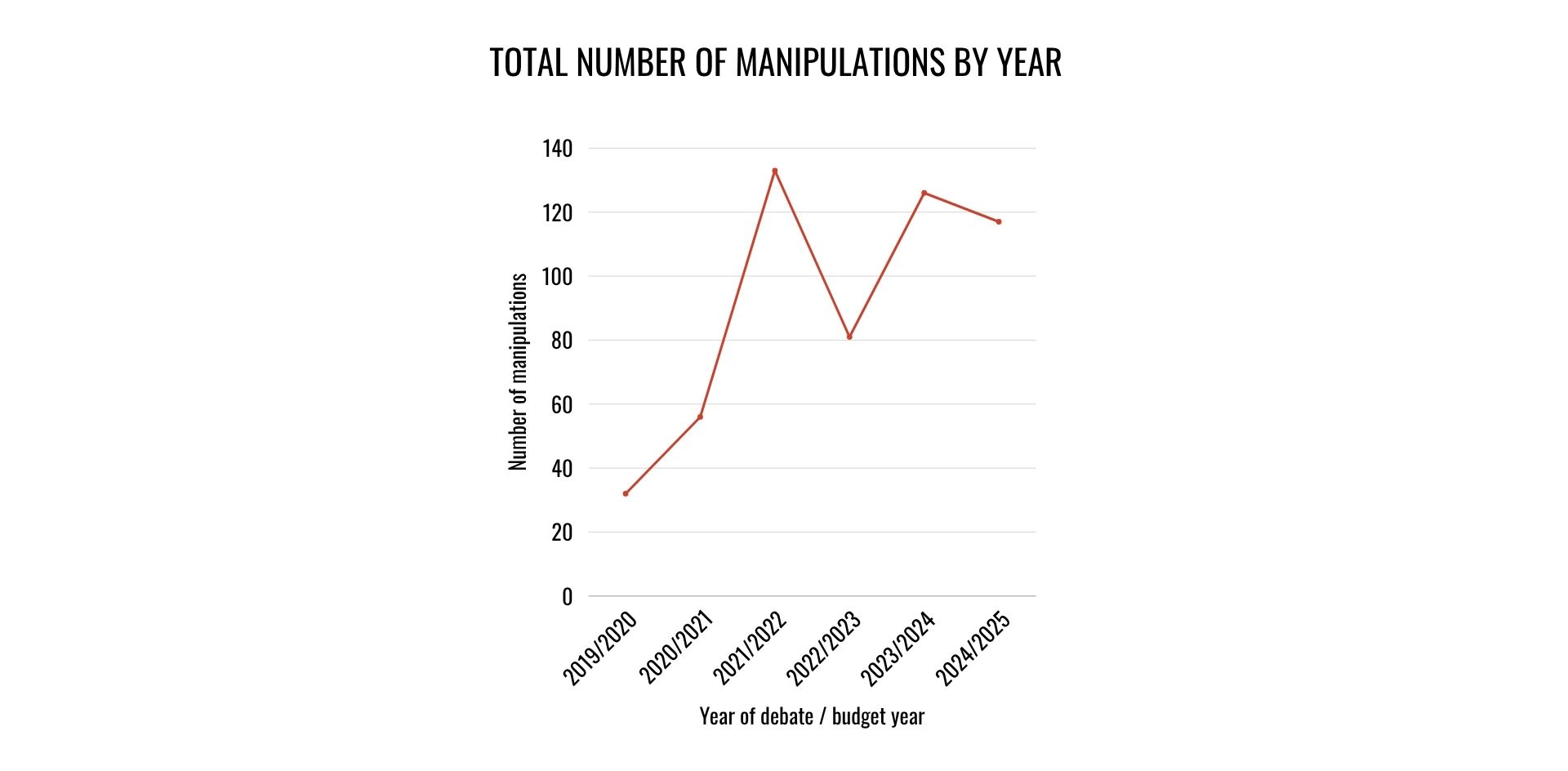
Over six years, we analyzed 542 manipulative statements (out of nearly 23,000 speeches), of which 510 were made by members of the opposition, 19 by the majority, and 13 by other actors. Between 2020 and 2022, there was a sharp increase in manipulations: from 33 instances in 2019 (budget-2020 discussions) to 130 in 2021 (budget-2022), coinciding with the beginning of a new political cycle, rising public disillusionment, and heightened parliamentary criticism of the government’s actions. In 2022 (budget-2023), the number of manipulations temporarily decreased to 79, a trend explained by the political consolidation during the initial months of the full-scale invasion and reduced motivation for public confrontation due to limited media access to Parliament. However, by 2023 (budget-2024), discourse radicalized once again, with manipulative statements rising to 125, and in 2024 (budget-2025), the figure remained high at 118.
Nonetheless, manipulative statements in speeches on state budget bills over the six-year period were identified in the remarks of only 63 MPs and other participants in the budget process—fewer than 14% of all individuals involved. Some deputies stand out as “leaders” in terms of the frequency of such rhetoric compared to their colleagues. However, it can be assumed that the leading manipulators may vary depending on the subject matter addressed by the bill under discussion.
Figure 1. Number of manipulative statements (share of total in parentheses) in MPs’ speeches during discussions of state budget bills, 2020–2025
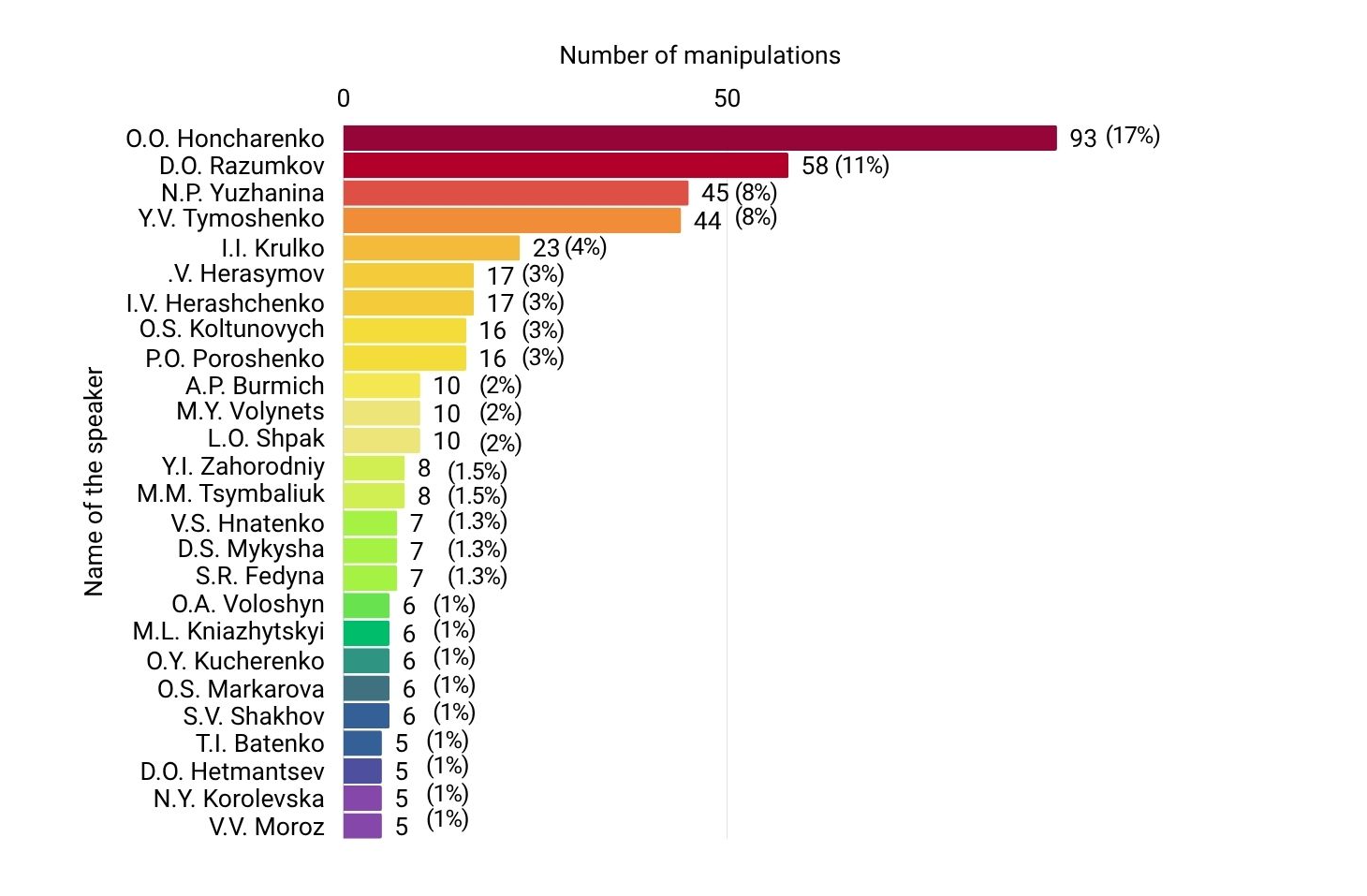
Manipulation by MPs: key types and tactics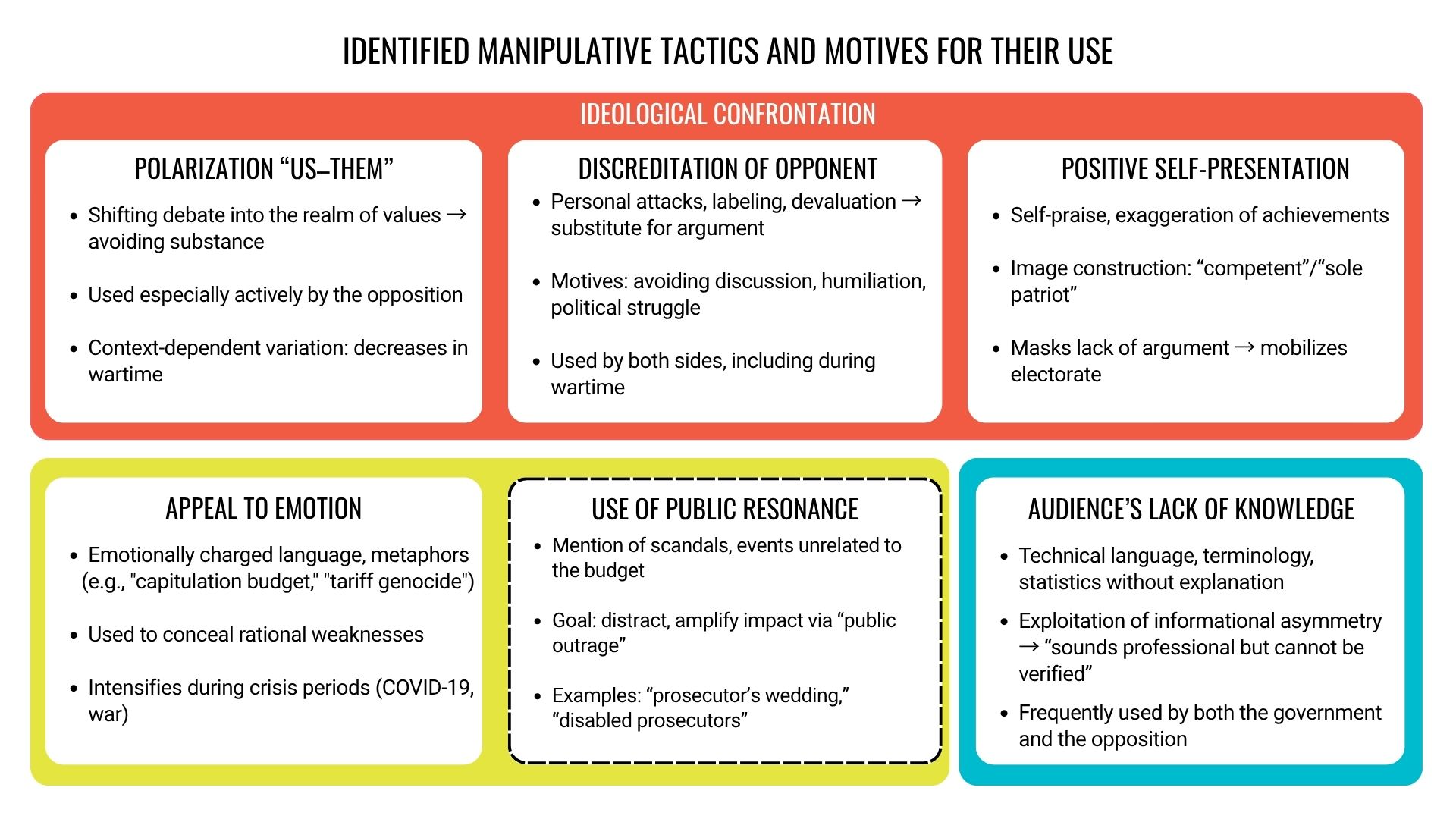
Source: compiled by the author. Note: manipulations characteristic of ideological confrontation are marked in red; emotional appeals and public resonance are in light green; and the audience’s lack of knowledge is in light blue.
In parliamentary debates on the state budget, manipulative techniques are increasingly used not to clarify the substance of decisions, but to sway the audience one way or another through emotions, imagery, and bias. One of the most common tactics is ideological confrontation, carried out through “us versus them” polarization, opponent discreditation, and positive self-presentation. The opposition often speaks on behalf of “the people” or “the army,” creating a dichotomy in which “we” are patriots and defenders, while “they” are the authorities who have allegedly distanced themselves from public needs. This kind of opposition helps avoid complex discussions about specific budgetary decisions by replacing them with emotionally charged value conflicts. It is often accompanied by discreditation—personal attacks, accusations of corruption or incompetence, without any factual substantiation.
Particular attention should be paid to positive self-presentation, in which the speaker actively praises themselves or their political force, emphasizing their morality, unity, or historical achievements. This tactic is effective in shaping a favorable public image, even when it bears no relation to the budget under discussion. All three elements of ideological confrontation—polarization, discreditation, and self-glorification—often operate in tandem, creating a closed rhetorical loop in which the goal is not dialogue but a battle for moral superiority.
Another tool is emotional appeal—the deliberate use of feelings such as fear, anger, pride, or indignation to mobilize support. Speakers rely on emotionally charged language, hyperbole, and metaphor (“tariff genocide,” “war budget,” “a humiliation for the country”) to create a powerful emotional backdrop that can overshadow rational understanding of facts. Particularly effective are references to public outcry—high-profile scandals, war-related topics, or protests. These techniques are used even when unrelated to the budget, as the manipulator seeks to “ride the wave” of outrage in order to delegitimize opponents.
A further widespread tactic is exploiting the audience’s lack of knowledge. In a complex and technical area such as the state budget, some speakers misuse terminology or statistics that the public cannot easily verify. This creates a false impression—either of a catastrophic situation or of the speaker’s expertise—when in fact it may simply be a carefully crafted rhetorical trap. All of these techniques lead to the same result: the degradation of political discourse, the replacement of analysis with emotion, and the reduction of debate to a struggle for influence.
What do MPs manipulate?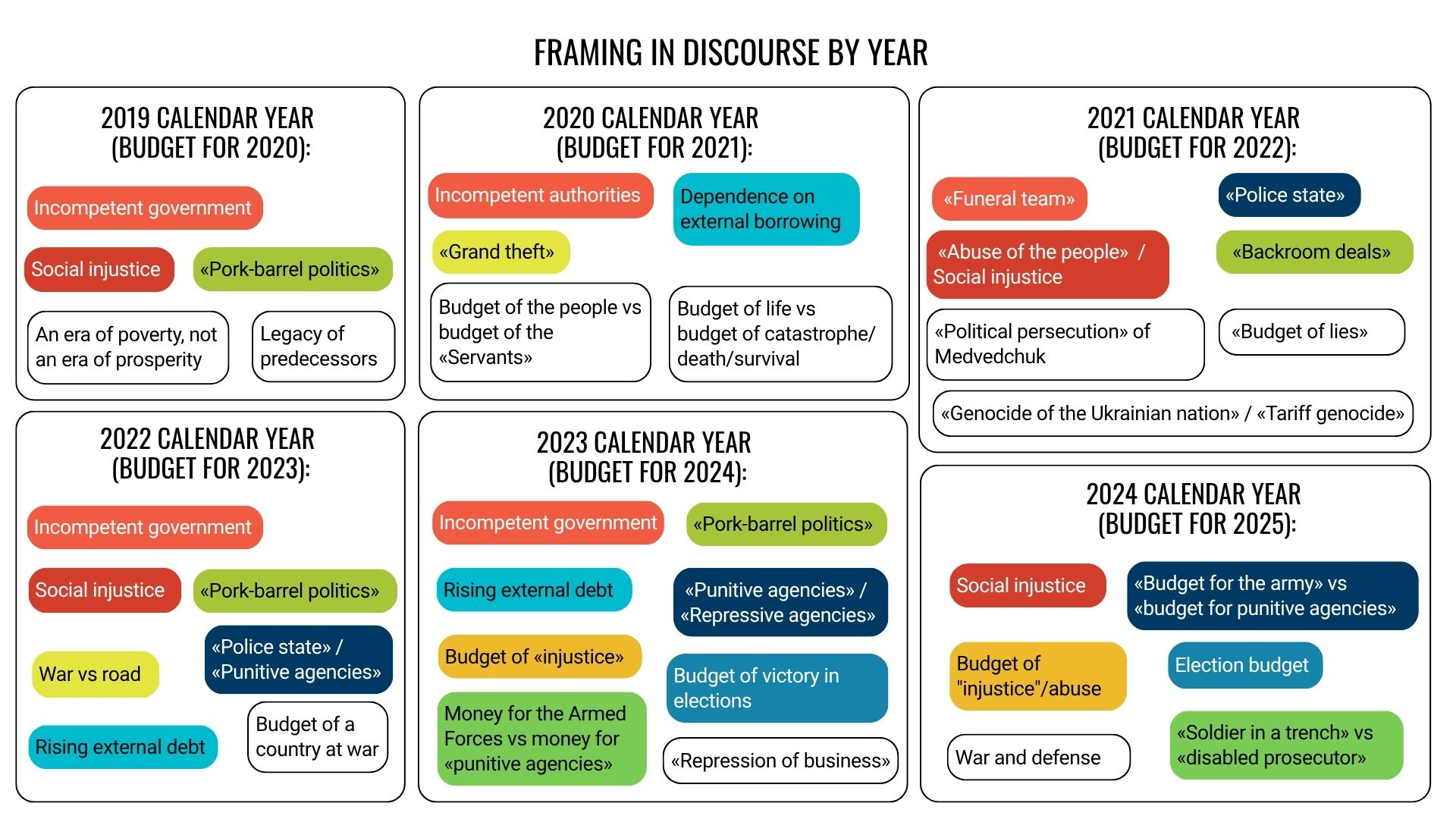
Throughout 2019–2024, parliamentary discourse on the draft State Budget of Ukraine shows a consistent trend toward framing—the use of recurring interpretations of reality aimed at shaping public attitudes toward the budget. Analysis of parliamentary transcripts revealed that each year was characterized by dominant narratives tailored to the political context and public expectations.
In 2019, during deliberations on the 2020 budget, the prevailing frames were “an unprofessional government” and “loss of national dignity,” reflecting distrust toward the newly elected political force. The “legacy of predecessors” frame was also actively used, shifting responsibility for current problems onto the previous administration. In 2020 (budget-2021), rhetoric became more radicalized: the number of manipulative statements nearly doubled, and leading frames included “government versus the people,” “fear for life” (in connection with the pandemic), and “theft under cover of COVID-19.” At the same time, emotional examples from the social sector—doctors, miners, teachers—were used more intensively to generate strong emotional rejection of government policy.
In 2021 (during discussions of the 2022 budget), the number of manipulative statements more than doubled. New frames emerged: “political persecution,” “the funeral team,” and “genocide of the Ukrainian nation”—the latter widely used to describe tariff policy. A narrative of a “police state” also took shape, centered on increased spending for the security sector. In 2022, with the onset of full-scale war, the overall number of manipulations declined by 40%, though the share of emotional appeals increased. The frame of a “wartime country’s budget” became dominant, partially displacing traditional ideological confrontation. Public debate became more limited, rhetoric less confrontational—though criticism of the government over “pork-barrel politics” and non-transparent funding persisted.
In 2023 (budget-2024), the number of manipulations returned to pre-war levels. The most common frames included “war vs roads,” “money for the army vs punitive agencies,” “repression of business,” and “budget of injustice.” Discourse grew more polarized, marked by heightened emotional intensity and clearly oppositional narratives. In 2024 (discussion of the 2025 budget), these trends continued. Frames such as “war and defense,” “soldier in a trench vs disabled prosecutor,” and “budget of injustice” became key tools for intensifying criticism of the budget as socially inequitable and politically motivated.
Dynamics of manipulation—who manipulates more: the opposition or the government?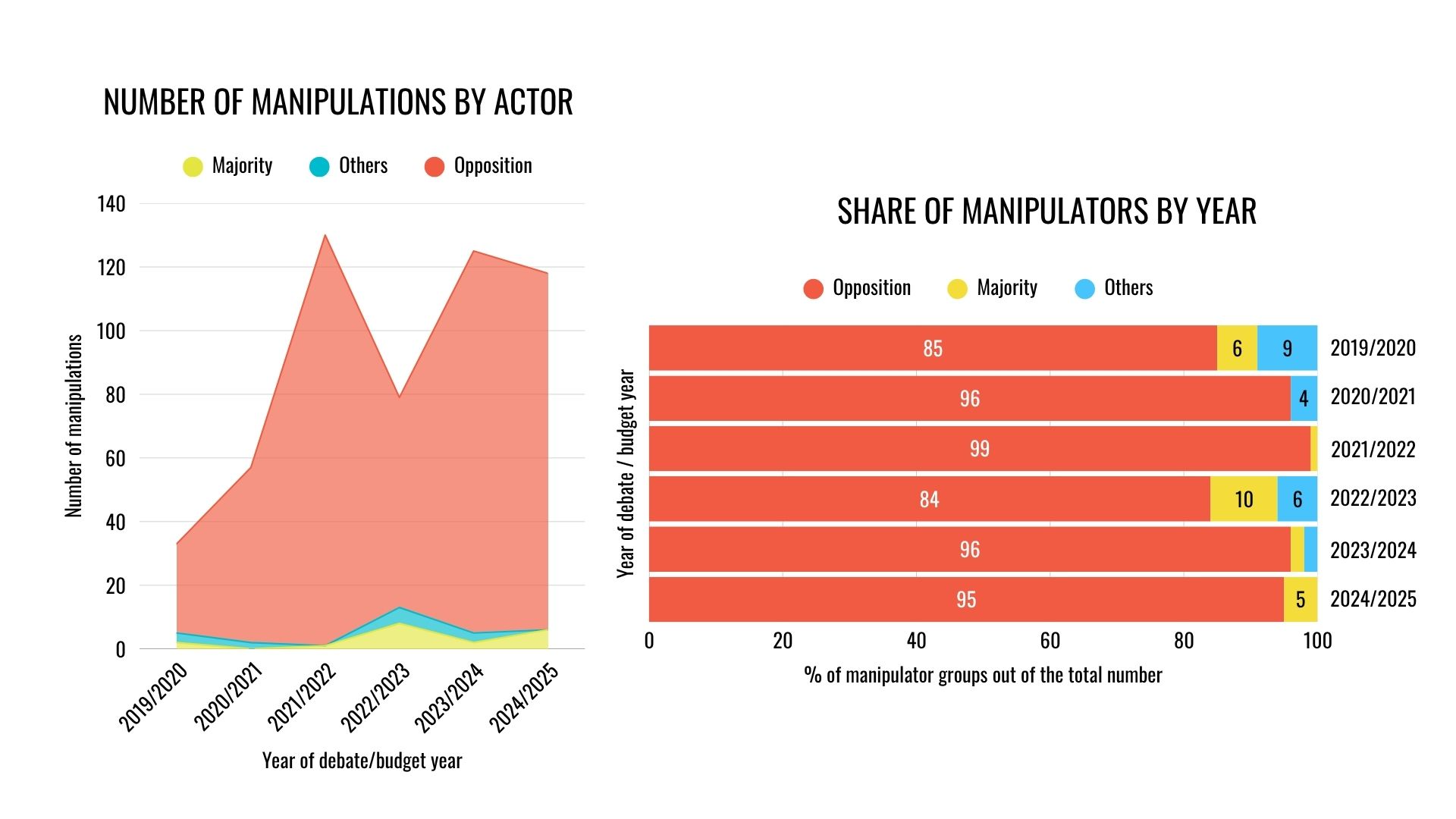
Analysis of parliamentary debates on the State Budget of Ukraine from 2020 to 2025 shows that the parliamentary opposition is the primary source of manipulative discourse. Between 84% and 99% of all manipulations were made by opposition MPs, while members of the majority used manipulative techniques far less frequently, typically accounting for no more than 5–10% of cases (with the exception of 2022, when their share rose to 10%—likely due to public appeals to patriotism amid wartime conditions).
Among the types of manipulation, emotional appeals dominate, increasing from an average of 43% during the three years prior to the full-scale invasion to 60% thereafter. These tactics have been actively employed by the opposition—through rhetoric of betrayal, catastrophe, and the “death budget”—and by the ruling majority during wartime, using the “victory budget” frame. Ideological confrontation was most prominent during the 2019–2021 calendar years, averaging 42% of all manipulations; however, from 2022 to 2024, it significantly declined in favor of emotional framing. This shift can be explained by the presence of an external enemy, which reduced the relevance of internal ideological disputes among MPs while amplifying emotional appeals. Manipulation through exploitation of limited audience knowledge remains less common but is gradually increasing—from 5 instances in 2019 to 20 in 2024—indicating growing use of complex terminology and statistics in budget debates.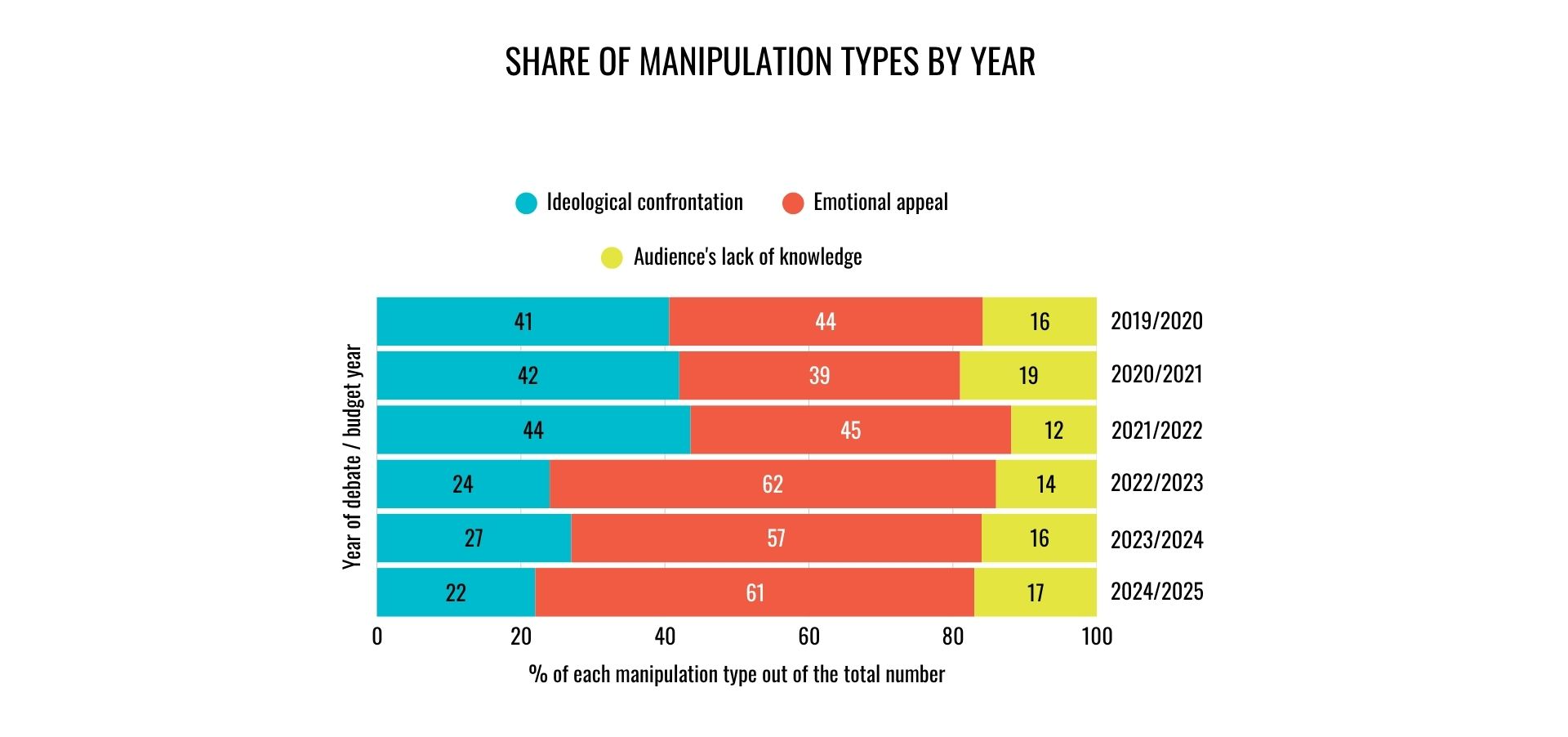
Conclusions and public policy recommendations
An analysis of parliamentary debates on the state budget of Ukraine during the 2021–2024 calendar years demonstrates that manipulation is an integral part of political discourse. The data show that the opposition is the primary source of manipulative rhetoric. Emotional appeals are the most common type of manipulation. In the context of an external threat, the number of ideologically driven confrontations among MPs decreases, while emotionally charged messaging increases. Crisis contexts influence both the type and quantity of manipulation during state budget debates. At the same time, rhetorical frames in these debates tend to recur from year to year.
To reduce the level of manipulation in parliamentary debates, three systemic solutions are recommended. First, a fact-checking mechanism should be established under the Verkhovna Rada to verify statements made by MPs during speeches, with the results published alongside official transcripts as annotated fact-checking notes. It would also be appropriate to consider amending the Rules of Procedure of the Verkhovna Rada to introduce accountability for knowingly spreading false information, as well as the possibility of adopting a parliamentary code of ethics. This would enhance responsibility for public statements. Second, it is necessary to promote media literacy and critical thinking among citizens—through school education, public campaigns, and partnerships with civil society organizations. An informed voter is better equipped to detect manipulation and resist populist claims. Third, it is crucial to support independent civil monitoring of parliamentary speeches. The presence of external oversight reduces the tendency toward distortion and promotes healthy political competition. Collectively, these measures would help foster a more responsible and fact-based discourse.
Photo: depositphotos.com/ua
Attention
The author doesn`t work for, consult to, own shares in or receive funding from any company or organization that would benefit from this article, and have no relevant affiliations

